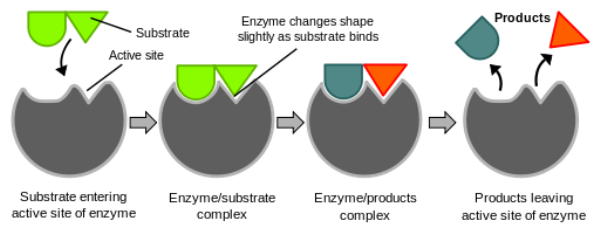What is a substrate?
1 Answer
A substrate is something that enzyme needs in order to perform its catalytic activity.
Explanation:
But the main point is that, 'An enzyme will bind to a specific substrate to transform it into products'. Thus, any substrate can't activate the active site of enzyme but a specific one. This means enzymes are highly specific in their actions. That's the reason that a single enzyme can catalyze only single chemical reaction or group of related reactions.
Relationship between enzyme and substrate:
Following theories are proposed to grasp the relationship of enzyme and substrate.
Emil Fischer proposed this model in
- As one specific key can open only a specific lock, just like that a specific enzyme can convert only one particular substrate into product(s).
- An active site is a rigid structure.
- And active play a role of template only. So, there is no modification in the active site before, during or after the reaction.
 faculty.ccbcmd.edu)
faculty.ccbcmd.edu)
Induced fit model:
Later studies revealed that all the enzymatic reactions do not follow Lock and Key Model. So, Koshland modified the Lock and Key Model and proposed its new version as Induced Fit Model in
According to this model:
- Active site is a flexible structure.
- And when a substrate binds to an enzyme, it induces changes in its structure.
- And these changes in active site enable the enzyme to perform its catalytic activity more effectively.
- When the substrate is converted into product(s), the enzyme reverts to its relaxed state until the next substrate comes along.



